By Leen Randell
Updated: Jul 04, 2024
10 Best Herbal Decoctions For Sore Throat

Herbal decoctions for sore throat are a natural remedy made by steeping herbs in hot water to create a soothing drink that helps alleviate the discomfort and pain associated with a sore throat.
These decoctions work by reducing inflammation, killing bacteria, and loosening mucus, providing relief from coughing and congestion. Examples of herbal decoctions that help with sore throats include ginger, slippery elm, and marshmallow root.
For instance, drinking a warm cup of ginger tea can help ease the discomfort and reduce swelling in the throat, allowing individuals to sleep better and feel more comfortable during the day.
The following article describes in detail the most important decoctions for sore throat, including medicinal properties, parts of herbs to use, and recipes for preparations.
- 1. Glycyrrhiza glabra
- 2. Zingiber officinale
- 3. Thymus vulgaris
- 4. Salvia officinalis
- 5. Melissa officinalis
- 6. Verbena officinalis
- 7. Corydalis ternata
- 8. Taraxacum officinale
- 9. Calendula officinalis
- 10. Matricaria chamomilla
- What is the best combination of herbal decoctions to use for sore throat?
- What ailments similar to sore throat are treated with herbal decoctions?
1. Glycyrrhiza glabra
Licorice decoctions helps with sore throat because of its potent anti-inflammatory properties.
The bioactive compounds in licorice root, such as glycyrrhizin and flavonoids, work synergistically to reduce swelling and ease pain in the mucous membranes of the throat. This natural remedy also exhibits antimicrobial effects, combating viral and bacterial infections that often cause sore throats.
As a result, herbal licorice decoctions provide fast and effective relief from discomfort, allowing sufferers to recover faster and speak comfortably again.

Medicinal Constituents
The list below shows the primary medicinal constituents in Glycyrrhiza glabra decoctions that help with sore throat.
- Glycyrrhizin: This triterpene saponin helps with sore throat by reducing inflammation and suppressing the production of pro-inflammatory enzymes, thus alleviating throat discomfort.
- Flavonoids: These phenolic compounds possess anti-inflammatory and antioxidant properties, which help to soothe and protect the mucous membranes in the throat, reducing pain and discomfort associated with a sore throat.
- Liquorice phenolic acids: These phenolic acids have antimicrobial and anti-inflammatory properties, which help to combat infections and reduce inflammation in the throat, thereby alleviating sore throat symptoms.
Parts Used
The list below shows the primary parts of licorice used to make decoctions for sore throat.
- Roots: The roots are used due to their rich content of glycyrrhizin, a compound with anti-inflammatory properties that helps soothe and calm a sore throat.
- Leaves: The leaves are used due to their ability to provide relief from sore throat through their soothing and anti-inflammatory properties.
- Barks: The barks are used due to their antimicrobial and anti-inflammatory properties, which help to reduce swelling and fight off infections in the throat.
Quick Recipe
The following recipe gives a procedure to make a basic licorice for sore throat.
- Harvest 100g of dried glycyrrhiza glabra roots from a reputable supplier or forage for them in their natural habitat.
- Rinse the dried roots in a fine mesh strainer under cold running water to remove any impurities.
- Combine the rinsed roots with 500ml of water in a medium saucepan and bring to a boil.
- Reduce heat to a simmer and let the decoction steep for 10-15 minutes or 30 minutes for a more potent brew.
- Strain the decoction through a fine mesh strainer into a clean container and discard the solids.
2. Zingiber officinale
Ginger decoctions helps with sore throat because of its natural anti-inflammatory properties, which soothe the mucous membranes in the throat.
The decoction's warm and spicy flavor helps to relax the throat muscles, reducing discomfort and pain. Additionally, ginger has natural antibacterial properties that help combat infections causing the soreness.
By drinking a warm ginger decoction, individuals can experience rapid relief from sore throat symptoms, promoting a faster recovery.
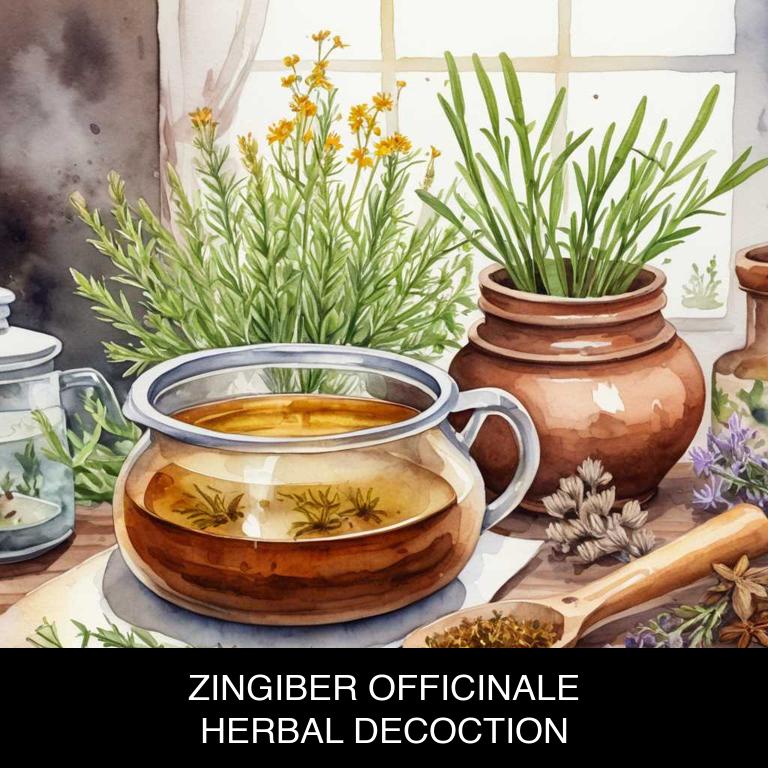
Medicinal Constituents
The list below shows the primary medicinal constituents in Zingiber officinale decoctions that help with sore throat.
- Gingerols: Gingerols, particularly [6]-gingerol, possess anti-inflammatory properties that help reduce swelling and pain associated with a sore throat.
- Shogaols: Shogaols, a type of phenolic compound, have antimicrobial properties that help combat infections causing sore throat, thereby providing relief.
- Zingibain: Zingibain, a proteolytic enzyme, has anti-inflammatory and mucolytic properties that help break down mucus and reduce congestion in the throat, providing relief from soreness.
Parts Used
The list below shows the primary parts of ginger used to make decoctions for sore throat.
- Roots: The roots of Zingiber officinale are also used for decoctions, as they contain similar active compounds to the rhizomes, which help to reduce inflammation and soothe sore throats.
- Buds: The buds, or young shoots, of the plant are sometimes used for decoctions, as they have a higher concentration of volatile oils and other bioactive compounds that may help to reduce pain and inflammation associated with sore throats.
Quick Recipe
The following recipe gives a procedure to make a basic ginger for sore throat.
- Harvest 1-2 inches of fresh zingiber officinale rhizomes and wash them thoroughly under cold running water.
- Slice the rhizomes into thin pieces about 1/8 inch thick for optimal decoction.
- Combine 1 teaspoon of the sliced rhizomes with 8 ounces of boiling water in a heat-resistant container.
- Reduce the heat to a simmer and let the mixture steep for 5-7 minutes or until the liquid has reduced.
- Strain the decoction through a fine-mesh sieve into a clean cup and discard the solids.
3. Thymus vulgaris
Thyme decoctions helps with sore throat because its antibacterial properties help combat infection-causing bacteria, reducing inflammation and pain.
The steam from the decoction can also help soothe and calm the mucous membranes in the throat, providing quick relief from discomfort. Additionally, thyme's antiseptic and anti-inflammatory compounds may aid in reducing redness and swelling of the throat tissues, allowing for easier swallowing and a more comfortable recovery.
This natural remedy has been used for centuries to alleviate sore throat symptoms, offering a safe and effective alternative to conventional treatments.
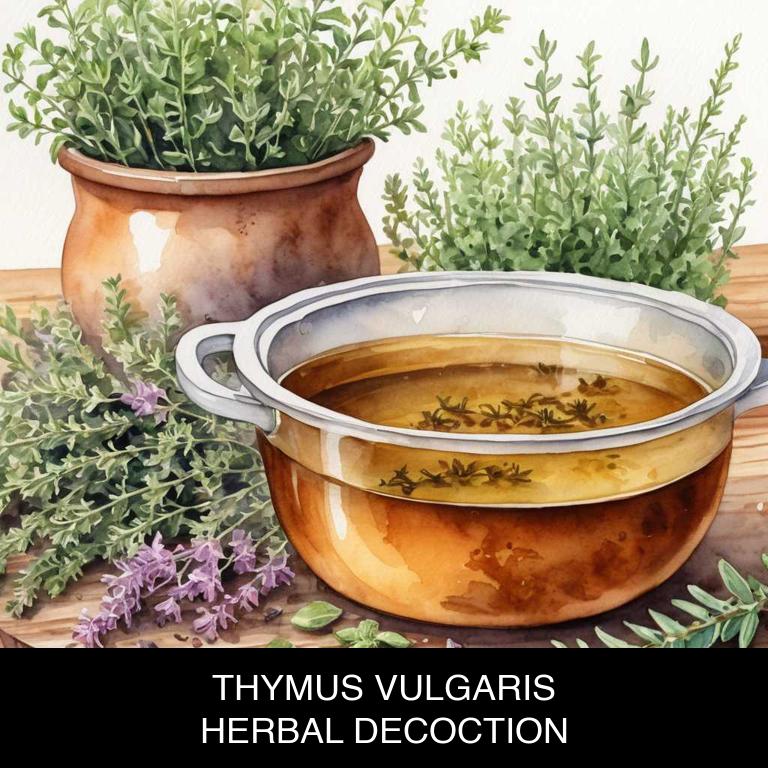
Medicinal Constituents
The list below shows the primary medicinal constituents in Thymus vulgaris decoctions that help with sore throat.
- Thymol: Thymol acts as an antimicrobial agent, helping to combat bacterial and viral infections that cause sore throat by inhibiting the growth of pathogens.
- Caryophyllene: Caryophyllene has anti-inflammatory properties, reducing swelling and pain associated with sore throat.
- Linalool: Linalool has a soothing effect on the mucous membranes, reducing inflammation and relieving discomfort associated with a sore throat.
Parts Used
The list below shows the primary parts of thyme used to make decoctions for sore throat.
- Leaves: Used for their antimicrobial and anti-inflammatory properties to help soothe and reduce throat inflammation.
- Flowers: Used for their antiseptic and antiviral properties to combat infections and promote healing in the throat.
- Stems: Used for their antiseptic and anti-inflammatory properties to help reduce throat inflammation and combat infections.
Quick Recipe
The following recipe gives a procedure to make a basic thyme for sore throat.
- Harvest fresh thymus vulgaris leaves and flowers in the morning for optimal potency and flavor.
- Dry the harvested thymus vulgaris thoroughly in a warm shaded area for 1 to 2 weeks.
- Crush 1 to 2 teaspoons of dried thymus vulgaris into a fine powder using a mortar and pestle.
- Combine the crushed thymus vulgaris powder with 8 ounces of boiling water in a saucepan.
- Steep the mixture for 5 to 10 minutes then strain it through a cheesecloth or fine-mesh sieve.
4. Salvia officinalis
Sage decoctions helps with sore throat because of its antibacterial, anti-inflammatory, and soothing properties.
The decoction's bioactive compounds, such as flavonoids and phenolic acids, work together to reduce inflammation and kill off bacteria that can cause infection. Additionally, sage's mucilages provide a protective coating to the throat, calming irritation and discomfort.
As a result, sage decoctions effectively alleviate sore throat symptoms, promoting a swift recovery from acute and chronic infections.
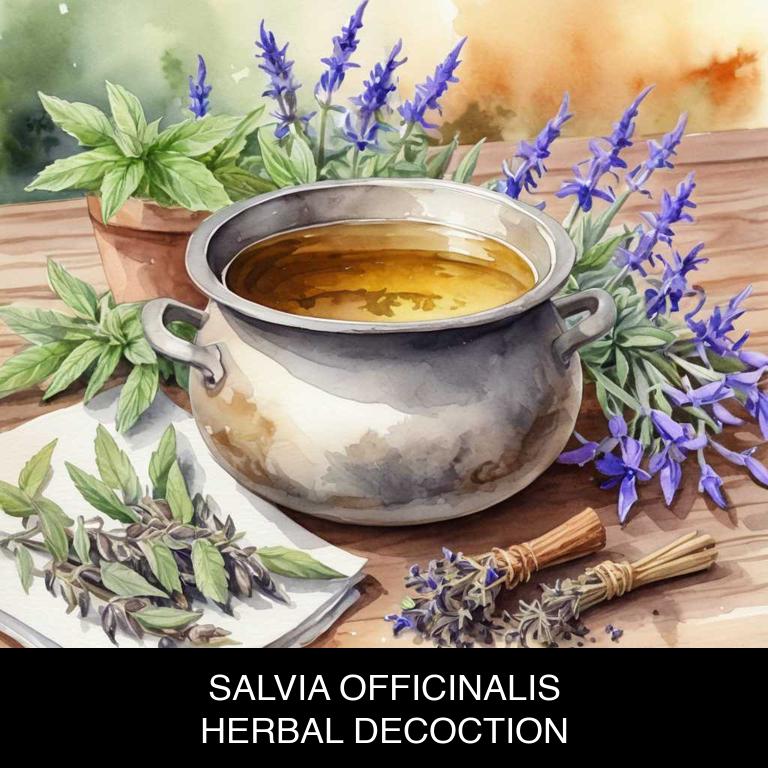
Medicinal Constituents
The list below shows the primary medicinal constituents in Salvia officinalis decoctions that help with sore throat.
- Tricosa-5,7,9-trienoic acid: This fatty acid has anti-inflammatory properties, which help to reduce swelling and inflammation in the throat, providing relief from soreness.
- Rosmarinic acid: As a phenolic compound with antioxidant and anti-inflammatory properties, rosmarinic acid helps to soothe the throat, reduce inflammation, and protect against oxidative stress.
- Ursolic acid: With its anti-inflammatory and antimicrobial properties, ursolic acid helps to combat bacterial and viral infections that can cause sore throats, promoting healing and reducing discomfort.
Parts Used
The list below shows the primary parts of sage used to make decoctions for sore throat.
- Leaves: The leaves are the most commonly used part due to their high concentration of bioactive compounds, particularly saponins and flavonoids, which exhibit anti-inflammatory properties.
- Stems: The stems of Salvia officinalis are also used for decoctions, as they contain a higher concentration of phenolic compounds compared to the leaves, which can help reduce inflammation and soothe the throat.
- Buds: The buds are another part used for sore throat decoctions, as they are rich in essential oils, particularly thujone, which has antimicrobial and anti-inflammatory properties that can help alleviate throat pain.
Quick Recipe
The following recipe gives a procedure to make a basic sage for sore throat.
- Harvest the salvia officinalis leaves at peak freshness when the plant is in full bloom.
- Dry the harvested leaves in a warm dark place for at least 14 days to reduce moisture content.
- Grind the dried leaves into a fine powder using a mortar and pestle or a coffee grinder.
- Combine 1-2 teaspoons of the powdered leaves with 8 oz of boiling water to create a decoction.
- Steep the mixture for 10-15 minutes then strain and discard the solids to obtain the final decoction.
5. Melissa officinalis
Lemon balm decoctions helps with sore throat because of its natural antiseptic and anti-inflammatory properties.
The decoction's soothing effects help reduce swelling and discomfort in the throat, providing instant relief from scratchiness and irritation. Additionally, lemon balm's antimicrobial properties combat viral and bacterial infections that can cause sore throats.
As a result, sipping on a warm cup of herbal lemon balm decoction can provide fast and effective alleviation of throat discomfort, allowing for improved breathing and a faster recovery.
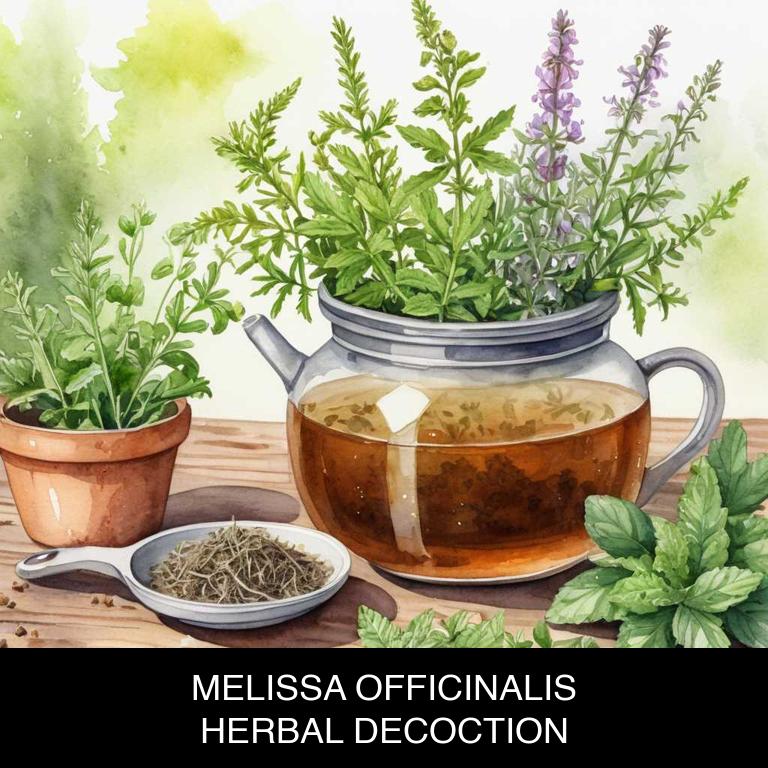
Medicinal Constituents
The list below shows the primary medicinal constituents in Melissa officinalis decoctions that help with sore throat.
- Rosmarinic acid: This phenolic compound has anti-inflammatory and antioxidant properties, which help reduce inflammation and soothe the mucous membranes, alleviating sore throat symptoms.
- Luteolin: This flavonoid has potent anti-inflammatory and antimicrobial properties, which help combat bacterial and viral infections that can cause sore throat, as well as reduce inflammation and promote healing.
- Caryophyllene oxide: This sesquiterpenoid has anti-inflammatory and antioxidant properties, which help reduce inflammation, promote healing, and alleviate pain associated with sore throat.
Parts Used
The list below shows the primary parts of lemon balm used to make decoctions for sore throat.
- Leaves: The leaves are the most commonly used part due to their high concentration of bioactive compounds, including flavonoids and terpenes, which exhibit anti-inflammatory and antimicrobial properties.
- Flowers: The flowers are used for their soothing and anti-inflammatory effects, which help to reduce swelling and pain in the throat.
- Roots: The roots are used for their expectorant properties, helping to loosen and clear mucus from the throat, providing relief from sore throat symptoms.
Quick Recipe
The following recipe gives a procedure to make a basic lemon balm for sore throat.
- Gather 1-2 teaspoons of dried melissa officinalis leaves and flowers from a reputable source.
- Combine the gathered melissa officinalis with 1 cup of boiling water in a heat-resistant cup.
- Steep the mixture for 5-7 minutes to allow the active compounds to infuse into the water.
- Strain the mixture through a fine-mesh sieve or cheesecloth to remove the melissa officinalis solids.
- Store the resulting decoction in the refrigerator for up to 24 hours before consumption.
6. Verbena officinalis
Lemon verbena decoctions helps with sore throat because its antiseptic and anti-inflammatory properties provide quick relief from discomfort.
The decoction's soothing warmth relaxes the muscles in the throat, reducing swelling and pain. Additionally, lemon verbena's natural antibacterial agents help combat infections that cause sore throats, promoting a healthy environment for healing.
As the warm liquid is swallowed, it coats the throat, providing instant relief and helping to ease coughing fits.
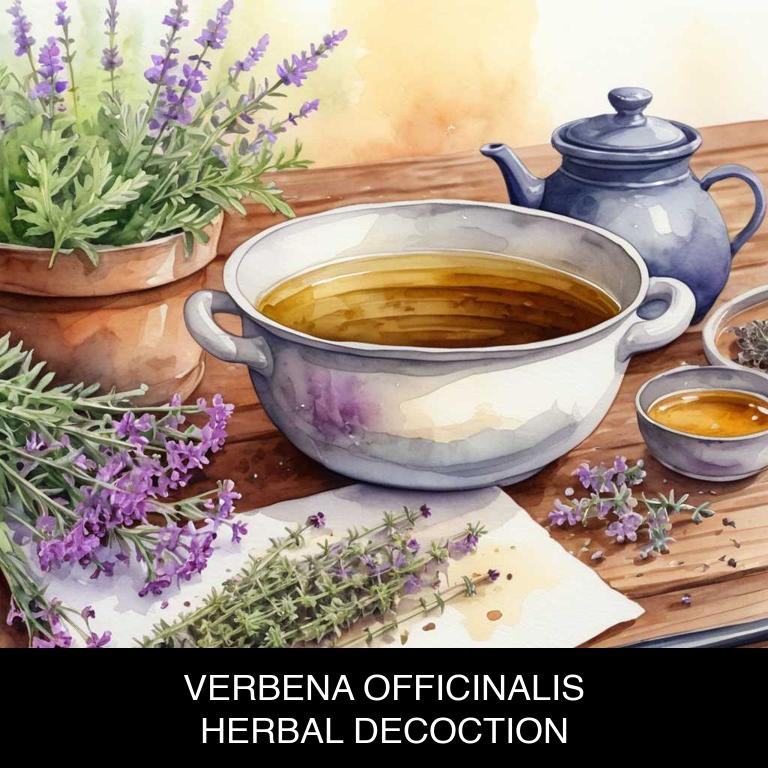
Medicinal Constituents
The list below shows the primary medicinal constituents in Verbena officinalis decoctions that help with sore throat.
- Verbascoside: It helps with sore throat due to its anti-inflammatory properties, which reduce swelling and pain in the throat.
- Limonene: It acts as an expectorant, helping to loosen and clear mucus from the throat, thereby reducing congestion and discomfort associated with sore throat.
- Rosmarinic acid: It exhibits antioxidant and anti-inflammatory activities, which help to reduce inflammation and oxidative stress in the throat, thereby alleviating soreness and discomfort.
Parts Used
The list below shows the primary parts of lemon verbena used to make decoctions for sore throat.
- Leaves: The leaves are used because they contain active compounds that help reduce inflammation and soothe the throat.
- Roots: The roots are used because they have been traditionally employed to treat various ailments, including sore throats, due to their medicinal properties.
- Flowers: The flowers are used because they are known to have anti-inflammatory and antibacterial properties that aid in soothing and healing sore throats.
Quick Recipe
The following recipe gives a procedure to make a basic lemon verbena for sore throat.
- Gather 20-30 grams of dried verbena officinalis root and leaves for decoction preparation.
- Combine the gathered dried verbena officinalis with 1 liter of boiling water in a saucepan.
- Reduce heat to low and simmer the mixture for 15 to 20 minutes to release active compounds.
- Strain the decoction through a cheesecloth or a fine-mesh sieve into a clean container.
- Allow the decoction to cool completely before refrigerating or freezing for later use.
7. Corydalis ternata
Yan hu suo decoctions helps with sore throat because of its unique composition of herbs, including Radix Rehmanniae, Radix Paenoiae Alba, and others.
These herbs have anti-inflammatory properties that reduce swelling in the mucous membranes, alleviating pain and discomfort associated with a sore throat.
Additionally, the decoction's expectorant properties help to loosen and clear mucus from the throat, promoting healthy drainage and relief from coughing.
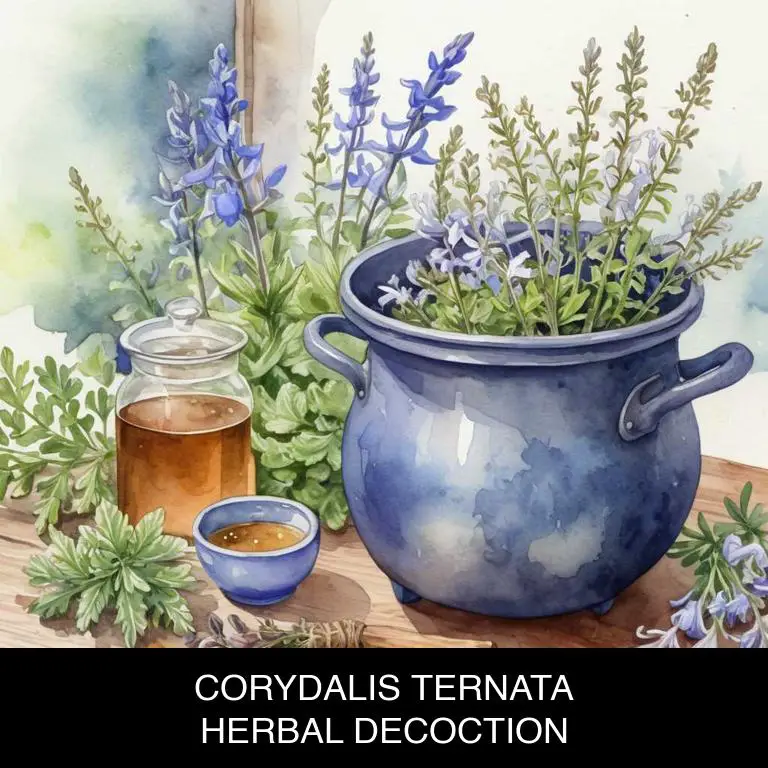
Medicinal Constituents
The list below shows the primary medicinal constituents in Corydalis ternata decoctions that help with sore throat.
- Corydaline: This alkaloid has anti-inflammatory properties, which can help reduce swelling and pain in the throat, providing relief from sore throat discomfort.
- Tetrahydroberberine: This alkaloid has antimicrobial properties, which can help combat bacterial and viral infections that can cause sore throat, promoting faster recovery.
- Palmitoyl-5-hydroxytryptamide: This indole alkaloid has antioxidant properties, which can help reduce oxidative stress and inflammation in the throat, soothing sore throat symptoms.
Parts Used
The list below shows the primary parts of yan hu suo used to make decoctions for sore throat.
- Roots: They are commonly used due to their high content of alkaloids, which are believed to have anti-inflammatory and pain-relieving properties.
- Leaves: The leaves are often used for their cooling and soothing effects, helping to reduce inflammation and discomfort associated with sore throats.
- Stems: The stems are also utilized for their medicinal properties, which are thought to help reduce swelling and promote healing in the throat.
Quick Recipe
The following recipe gives a procedure to make a basic yan hu suo for sore throat.
- Harvest corydalis ternata roots and rhizomes in early spring or late summer for maximum potency.
- Rinse 30-60 grams of the harvested material with clean water to remove any impurities.
- Chop the roots and rhizomes into small pieces and soak them in 1 liter of water for 30 minutes.
- Simmer the soaked mixture over low heat for 30-60 minutes or until the liquid has reduced slightly.
- Strain the decoction and discard the solids to obtain a concentrated herbal remedy.
8. Taraxacum officinale
Dandelion decoctions helps with sore throat because of its natural anti-inflammatory properties, which soothe and calm irritated tissues.
The diuretic properties of dandelion also help to reduce swelling in the throat, alleviating discomfort and pain. Additionally, dandelion's antimicrobial effects combat infections that can cause sore throats, promoting a healthy environment for the recovery process.
As a result, dandelion decoctions provide effective relief from the discomfort and pain associated with sore throats.

Medicinal Constituents
The list below shows the primary medicinal constituents in Taraxacum officinale decoctions that help with sore throat.
- Taraxasterol: This triterpenoid saponin helps with sore throat by exhibiting anti-inflammatory properties, reducing swelling and pain in the throat.
- Taraxasterol acetate: Another triterpenoid saponin, taraxasterol acetate assists in soothing a sore throat by suppressing the production of pro-inflammatory cytokines, which contribute to throat discomfort.
- Apigenin: A flavonoid phenolic compound, apigenin helps alleviate sore throat symptoms by acting as an antioxidant and anti-inflammatory agent, protecting the throat tissues from oxidative damage and reducing inflammation.
Parts Used
The list below shows the primary parts of dandelion used to make decoctions for sore throat.
- Roots: The roots are used due to their high concentration of inulin, which has anti-inflammatory properties that help soothe a sore throat.
- Leaves: The leaves are used due to their content of flavonoids, which have antioxidant and anti-inflammatory properties that aid in reducing throat irritation.
- Flowers: The flowers are used due to their high content of saponins and flavonoids, which have anti-inflammatory and soothing effects that help alleviate a sore throat.
Quick Recipe
The following recipe gives a procedure to make a basic dandelion for sore throat.
- Harvest fresh taraxacum officinale leaves and flowers in the early morning or late afternoon.
- Clean and dry the collected plant material to prevent contamination and preserve its properties.
- Combine 1 tablespoon of taraxacum officinale leaves and flowers with 1 cup of boiling water and let steep for 5 minutes.
- Strain the decoction through a cheesecloth or a fine-mesh sieve into a clean container to remove solids.
- Store the taraxacum officinale decoction in the refrigerator for up to 24 hours before consumption.
9. Calendula officinalis
Pot marigold decoctions helps with sore throat because of its antiseptic and anti-inflammatory properties.
The plant contains flavonoids, terpenes, and phenolic acids that help reduce swelling and pain in the throat. When consumed as a warm tea or gargled as a decoction, pot marigold's active compounds work to soothe inflamed tissues and calm coughing spasms. Additionally, its antimicrobial properties help combat bacterial and viral infections that can cause sore throats.
As a natural remedy, pot marigold decoctions provide effective relief from discomfort and promote rapid recovery.
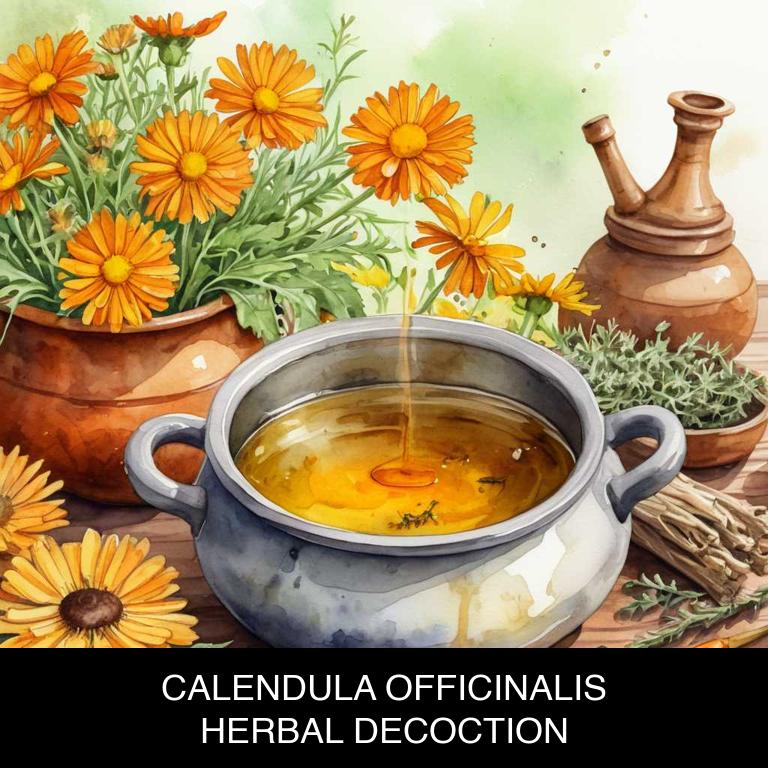
Medicinal Constituents
The list below shows the primary medicinal constituents in Calendula officinalis decoctions that help with sore throat.
- Sesquiterpenes: These compounds possess anti-inflammatory and antimicrobial properties, helping to reduce swelling and prevent infection in the throat, thereby alleviating soreness.
- Triterpenoids and triterpene saponins: These components exhibit anti-inflammatory, antioxidant, and immunomodulatory effects, which can help to soothe and protect the mucous membranes in the throat, reducing inflammation and pain.
- Phenolic acids: These compounds have potent antioxidant and anti-inflammatory properties, which can help to neutralize free radicals, reduce oxidative stress, and alleviate throat discomfort caused by inflammation.
Parts Used
The list below shows the primary parts of pot marigold used to make decoctions for sore throat.
- Flowers: The flowers of Calendula officinalis are commonly used to make decoctions for sore throat due to their anti-inflammatory and antimicrobial properties.
- Leaves: The leaves are used for their soothing and anti-inflammatory effects, which can help to reduce throat discomfort and inflammation.
- Roots: The roots of Calendula officinalis contain compounds that have anti-inflammatory and antimicrobial properties, making them useful for treating sore throats.
Quick Recipe
The following recipe gives a procedure to make a basic pot marigold for sore throat.
- Harvest a sufficient quantity of calendula officinalis flowers by cutting them at the base of the stem.
- Dry the harvested flowers by spreading them out in a single layer on a paper bag for 1 week.
- Weigh 1 teaspoon of dried calendula officinalis flowers and place them in a saucepan.
- Combine 1 cup of boiling water with the dried calendula officinalis flowers and allow it to steep for 5 minutes.
- Strain the liquid from the calendula officinalis flowers and discard the solids to create the decoction.
10. Matricaria chamomilla
Chamomile decoctions helps with sore throat because of its anti-inflammatory and soothing properties.
When consumed as a warm drink, chamomile's flavonoids and terpenoids work to reduce swelling and ease pain in the throat, providing quick relief from discomfort. Additionally, chamomile's antimicrobial compounds help combat infection-causing bacteria and viruses, promoting healing and reducing inflammation.
This natural remedy offers a gentle yet effective way to alleviate sore throats, making it a popular choice for those seeking a non-pharmacological solution.
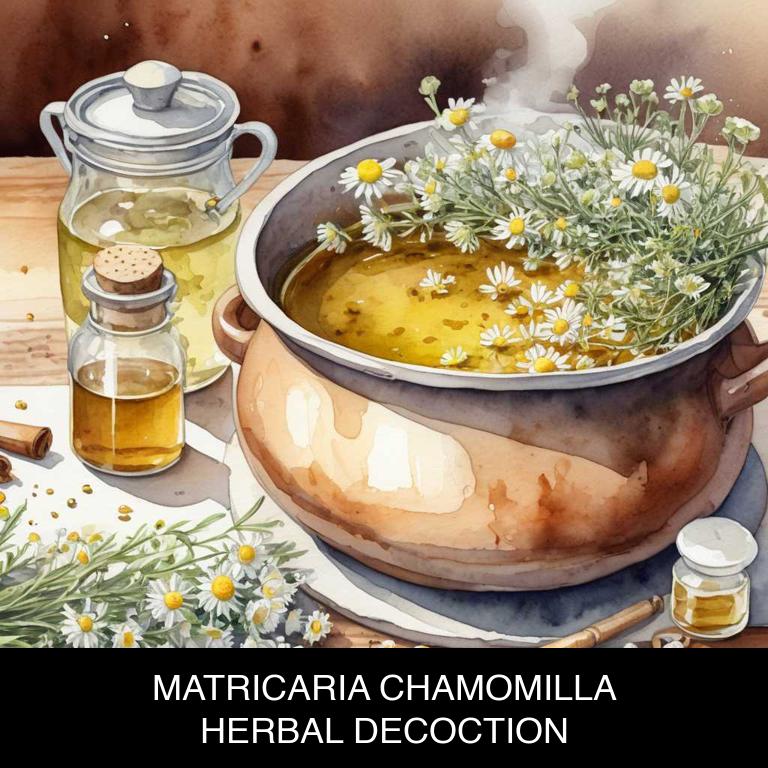
Medicinal Constituents
The list below shows the primary medicinal constituents in Matricaria chamomilla decoctions that help with sore throat.
- Apigenin: This flavonoid has anti-inflammatory properties that help reduce swelling and pain associated with a sore throat.
- Alpha-bisabolol: This sesquiterpene has anti-inflammatory and antimicrobial properties that help soothe and protect the mucous membranes of the throat, reducing discomfort and inflammation.
- Luteolin: This flavonoid has antioxidant and anti-inflammatory properties that help reduce oxidative stress and inflammation in the throat, promoting healing and alleviating symptoms of a sore throat.
Parts Used
The list below shows the primary parts of chamomile used to make decoctions for sore throat.
- Flowers: Used for their anti-inflammatory and soothing properties to calm a sore throat.
- Seeds: Used to add a sedative effect and aid in relaxation, helping to reduce throat discomfort.
- Leaves: Used to add a small amount of bitterness and aid in reducing inflammation in the throat.
Quick Recipe
The following recipe gives a procedure to make a basic chamomile for sore throat.
- Harvest 20-30 grams of dried flowers or 40-50 grams of fresh flowers of matricaria chamomilla.
- Chop the flowers into small pieces to facilitate infusion.
- Combine the chopped flowers with 250 milliliters of boiling water.
- Steep the mixture for 5-10 minutes to allow for extraction of active compounds.
- Strain the decoction and discard the solids to obtain a clear liquid.
What is the best combination of herbal decoctions to use for sore throat?
The best combination of herbal decoctions that help with sore throat is a blend of soothing and antibacterial properties.
Combine equal parts of Slippery Elm decoction to calm inflammation, Echinacea decoction to boost immunity, and Thyme decoction to fight off infections. Add a pinch of Licorice Root decoction to reduce pain and inflammation. This harmonious blend of herbal decoctions can effectively heal sore throats, reduce discomfort, and promote overall well-being.
Regular consumption can also help prevent future occurrences.
What ailments similar to sore throat are treated with herbal decoctions?
Ailments similar to sore throat that are treated with herbal decoctions are tonsillitis, pharyngitis, laryngitis, and bronchitis.
Herbal decoctions made from ingredients like slippery elm, licorice root, and marshmallow root help soothe irritated mucous membranes, reduce inflammation, and combat bacterial and viral infections.
These natural remedies also alleviate coughs, hoarseness, and difficulty swallowing associated with these conditions.